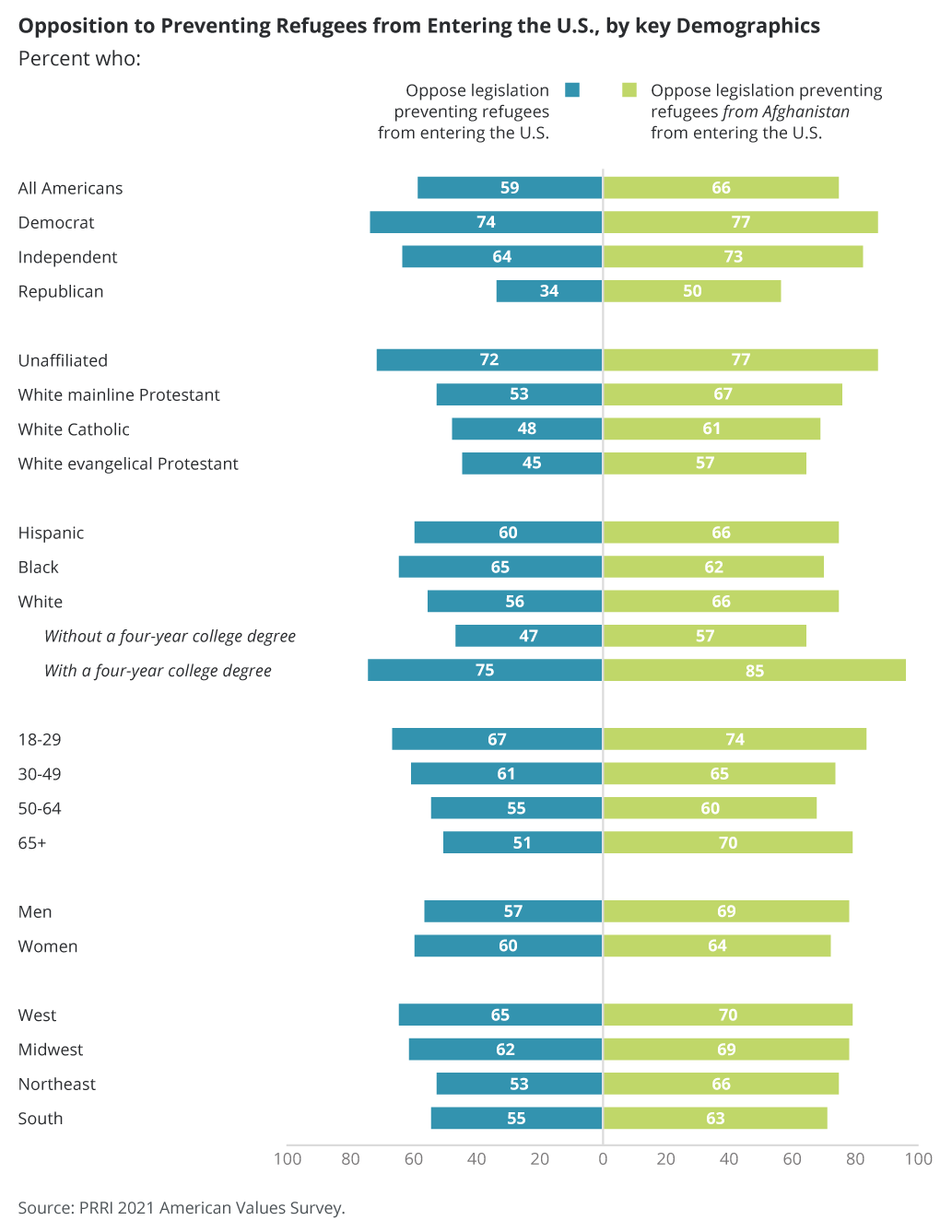The completion of the U.S. withdrawal from Afghanistan at the end of August 2021 escalated the need to resettle Afghans across the United States. Roughly 76,000 Afghans were brought to the U.S., most of whom have already been resettled. The remaining 8,000 are living in military bases until their cases are handled.1 Approximately 2,500 Afghans are still living at U.S. military bases abroad, while others are spread across various countries with “no clear plan of where to head next.”2
Even though the Biden administration has vowed to reverse the substantial damage done to the U.S. refugee system during Donald Trump’s four years as president, including increasing the refugee cap from the historic low of 15,000 to 125,000 for the fiscal year 2022, in practice, the administration has struggled to meet its promise. In the fiscal year 2021, the Biden administration admitted fewer than 12,000 people, the lowest number of admissions since the refugee program was created in 1980.3
In August 2021, PRRI asked Americans to what extent they agree or disagree with the statement “The U.S. should pass a law that places stricter limits on the number of immigrants coming to the U.S.” but also exposed Americans to three additional scenarios, involving “legal immigrants,” “illegal immigrants,” and “refugees” coming to the U.S. The survey reveals that the majority of Americans disagree with this policy when they think about legal immigrants (53%) but are notably less likely to do so when they think about refugees (42%) and undocumented immigrants (37%), compared to about half of Americans (47%) who disagree with this policy when they think about immigrants in general.
To better understand Americans’ views of refugees specifically, in September 2021, PRRI asked them if they favor or oppose passing a law to prevent refugees from entering the United States. About six in ten Americans (59%) opposed passing this law, compared to about four in ten (39%) who favored it. While opposition went up from 59% in 2017 to 64% in 2019, it bounced back in 2021. By contrast, support for this policy has stayed constant since 2017 (36%).
In the same survey, we asked the same question but focused on refugees from Afghanistan. This time, Americans were notably more opposed to this policy (66% oppose vs. 29% favor) than they were when thinking about refugees in general (59% oppose vs. 39% favor).

Republicans (34%) are about half as likely as independents (64%) and Democrats (74%) to oppose the passage of a law that would prevent refugees from entering the United States. About two-thirds of Republicans favor this policy (65%). However, when Republicans think about refugees from Afghanistan specifically, they are split on this question (49% favor, 50% oppose). Independents are also more opposed to this policy when they think about refugees from Afghanistan (73%). By contrast, Democrats do not differ significantly in their opposition to this policy when asked about refugees from Afghanistan or refugees in general (77% vs. 74%).
White evangelical Protestants are more likely to favor (54%) than to oppose (45%) passing legislation that prevents refugees from entering the United States, but when the question specifies refugees from Afghanistan, white evangelicals are more likely to oppose (57%) than to favor (40%) this policy. Similarly, white mainline Protestants (47% favor, 53% oppose) and white Catholics (51% favor, 48% oppose) are split on this question, but when thinking about refugees from Afghanistan specifically, both are notably more likely to oppose (67% and 61%, respectively) than to support this policy (32% and 37%, respectively). In both cases, the vast majority of unaffiliated Americans oppose this policy (72% and 77% refugees from Afghanistan).4
Even though a majority of white Americans (56%) oppose a ban on refugees entering the U.S., they are less likely to oppose it than Hispanic Americans (60%) and Black Americans (65%). Still, when the ban refers to refugees from Afghanistan (66%), white Americans are more likely to oppose it, as are two-thirds of Hispanic Americans (66%). When asked about refugees from Afghanistan, Black Americans do not differ significantly in their opposition to this policy from refugees in general (62% vs. 65%). White Americans with college degrees are more likely than white Americans without college degrees to oppose this policy (75% vs. 47%), but greater shares of both groups are in opposition when it refers to refugees from Afghanistan (85% vs. 57%).
Opposition to this policy increases with education, from Americans with a high school education or less (50%) to Americans with some college (56%), Americans with college degrees (69%), and Americans with postgraduate degrees (76%). When the question specifies refugees from Afghanistan, with the exception of Americans with a high school education or less (51%), Americans across all other levels of education are more likely to oppose this policy (70%, 78%, and 87%, respectively).
By contrast, opposition to passing legislation that prevents refugees from entering the United States decreases with age, from Americans ages 18–29 (67%) to Americans ages 30–49 (61%), Americans ages 50–64 (55%), and Americans 65 and over (51%). There are no notable differences among those in the middle age categories when they think about refugees from Afghanistan, but younger and older Americans are notably more likely to oppose this policy (74% and 70%, respectively).
While there are no differences between men (57%) and women (60%) in opposition to banning refugees from entering the United States, when refugees from Afghanistan are specified, more men are opposed to this policy than women (69% vs. 64%).
Majorities of Americans who live in the Northeast (53%), the South (55%), the Midwest (62%), and the West (65%) oppose a ban on refugees, but when thinking about refugees from Afghanistan specifically, Americans who live in the Northeast (66%) and the South (63%) are significantly more likely to do so.
Endnotes
1 https://www.cbsnews.com/news/afghan-evacuees-lack-pathway-to-permanent-legal-status-in-the-u-s/
2 https://www.wsj.com/articles/afghan-refugees-us-military-visa-11637450916
3 It is worth noting that Afghan refugees are resettled outside the context of the refugee admissions program. https://www.whitehouse.gov/briefing-room/presidential-actions/2021/02/04/executive-order-on-rebuilding-and-enhancing-programs-to-resettle-refugees-and-planning-for-the-impact-of-climate-change-on-migration/, https://www.migrationpolicy.org/programs/data-hub/charts/us-annual-refugee-resettlement-ceilings-and-number-refugees-admitted-united
4 The number of cases for all other religious groups is <100.